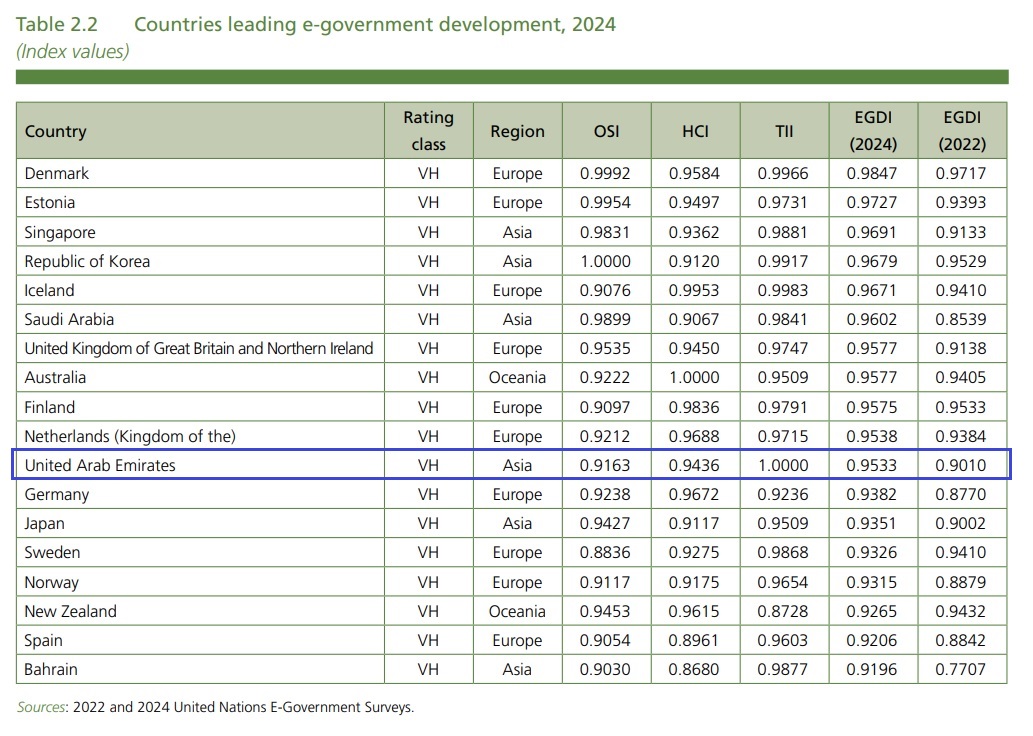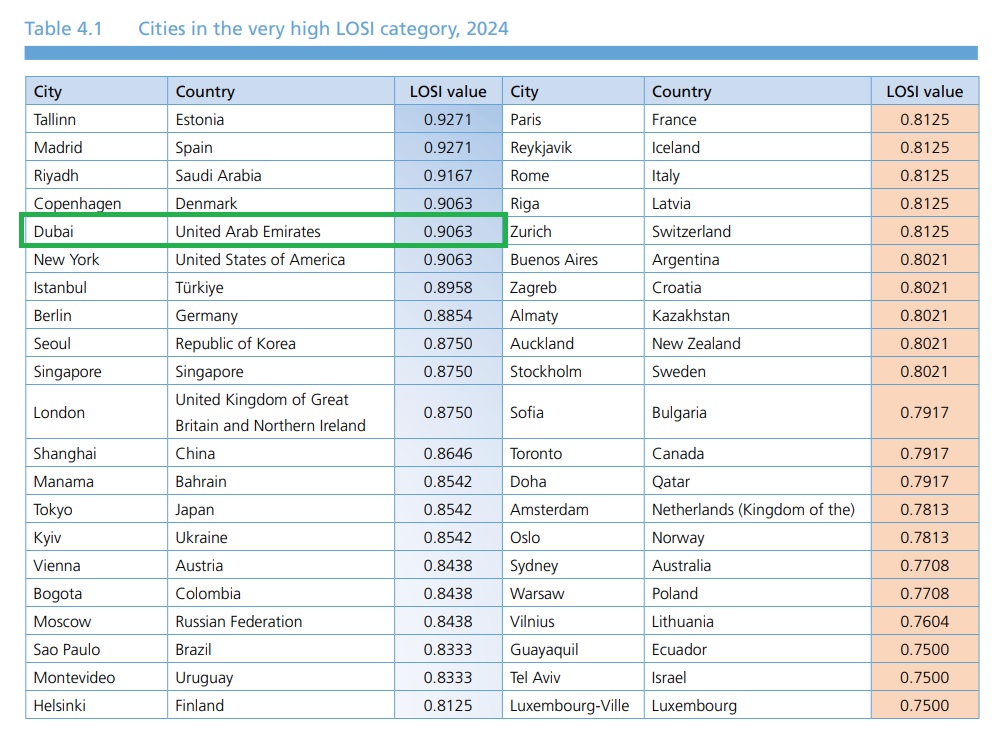

The UN E-Government Survey
Published biennially, the UN E-Government Survey reviews the rate of digital transformation in the UN Member States and addresses the various programmes that utilise information and communication technologies to provide better and faster public services to the various segments of the society. This section covers the achievements of the UAE in the UN E-Government Development Index (EGDI).
Scope of the UN eGovernment Survey
The United Nations E-Government Survey issued by the UN’s Department of Economic and Social Affairs assesses the development of digital transformation of governments of the 193 Member States of the United Nations. The survey measures the effectiveness of eGovernments in the delivery of public services and identifies patterns in the development and performance of eGovernments. It also assesses countries and areas where the potential of information and communications technologies (ICT) and eGovernment has not been fully exploited yet and where capacity development support might be helpful.
The survey tracks the progress of eGovernment development via the United Nations E-Government Development Index (EGDI). The EGDI, which assesses the development of eGovernment at the national level, is a composite index of three sub-indices: Online Services Index (OSI), Telecommunication Infrastructure Index (TII) and Human Capital Index (HCI).
The UAE's rank in the 2024 Survey
In the UN E-Government Survey 2024, the UAE was ranked:
- 11th globally in the overall UN E-Government Development Index (EGDI) with a score of 0.9533
- 1st and the only country globally with the highest score (1.0000) in the Telecommunications Infrastructure Index
- 1st amongst Asian and Arab countries in the Human Capital Index with a score of 0.9436
- 1st globally in the E-Government Literacy sub-index of the Online Services Index (OSI)
- 1st globally in the Institutional Framework sub-index of the Online Services Index (OSI)
- 1st globally in the Content Provisioning sub-index of the Online Services Index (OSI).
Excerpts from the report:
The United Arab Emirates (UAE) is a leader in digital transformation, focusing on revolutionizing governance and public services. The U-Ask initiative uses generative AI to provide seamless access to government services. The Federal Digital Network (FedNet) enhances efficiency through AI solutions and pre-trained machine learning models. The UAE’s leadership in global standards, such as PAS2009:2024, and the national Design Language System (DLS), ensure consistency and accessibility across federal government websites. UAE PASS, the national identity platform, promotes unified access to all government services. The UAE continues to set new standards for digital government worldwide.
The United Arab Emirates fosters AI innovation through initiatives such as the AI Lab and the Dubai Blockchain Strategy, promoting the use of AI to improve public services delivery and position Dubai as a leader in AI adoption.
Madrid and Tallinn are ranked first, providing nearly 93 per cent of the features assessed, followed by Riyadh, Copenhagen, Dubai, New York City, Istanbul, Berlin, Seoul and Singapore in the top ten.
While many cities meet all indicators for the institutional framework criterion, Madrid, London, New York and Tokyo stand out as the only cities meeting all indicators relating to content provision. Excellent compliance rates have also been achieved by Riyadh for services provision, by Seoul for participation and engagement, and by Dubai for technology. These achievements underscore the varying degrees of success cities have in meeting the diverse requirements of local e-government.
An analysis of smart city initiatives around the world reveals varying levels and stages of engagement, implementation and visibility. Many cities, including Dubai, Amsterdam, Riyadh, Seoul, Singapore and New York City, are actively engaged in smart city development.
The UAE's rank in the 2022 Survey
The UAE was ranked first in Arab region and 13th globally in the overall UN E-Government Development Index (EGDI). The UAE’s overall global rank improved by 8 positions from the previous edition and continued to lead the region. It received a ‘Very high’ (VH) rating which is the highest score for the development of digital governments around the world.
Additionally, the UAE was ranked 1st globally in ‘Content Provision’ and ‘Institutional Framework’ which are sub-indices of the ‘Online Service Index’ (OSI).
The ‘Content Provision’ index measures the availability of basic public information and resources online. The ‘Institutional Framework’ focuses, among other things, on digital government strategy, organisational structure, legislation on access to information and privacy, and open data policy.
EGDI 2022 highlighted the increasing contribution of digital transformation and the digital government in accelerating the realisation of the 2030 SDGs and the important role that digital government tools have played to fight the COVID-19 pandemic.
Read more about the UAE’s progress in EGDI (PDF, 6.09 MB)
Dubai’s rank in EGDI
For the first time, the survey assessed the eGovernment in the most populous city in each of the 193 United Nations member states. To that end, Dubai was ranked 1st in the Arab region and 5th globally in the ‘Local Online Service Index’ (LOSI).
Additionally, it obtained the 1st position globally in the following sub-indices of LOSI:
- Institutional Framework
- Content Provision
- Service Provision.
It received 4th ranking in the ‘Technology’ index.

Read news coverage about Dubai’s ranking in EGDI.
Related links:
- UN eGovernment Survey Reports (from 2003-2024) - UN Library
- Country data in UN E-Government Survey
- The UAE is Ranked first in the Arab world and 8th Globally in the Online Service Index (OSI) of the EDGI report (2020) – TDRA
- The UAE is Ranked Sixth Globally in Online Services Index According to the UN EDGI Report Covering 193 Countries (2018) – TDRA
- UAE rankings - Federal Competitiveness and Statistics Authority
Arabic versions of the UN E-Government Survey
Aiming to leverage the global experiences and benchmarkings to develop digital transformation in Arab countries, Telecommunications and Digital Government Regulatory Authority (TDRA) translated and then, along with Department of Economic and Social Affairs at the United Nations (UNDESA), issued the official Arabic version of the UN E-Government Survey. Find:
- Arabic version of the UN E-Government Survey 2022 (PDF, 6.09 MB)
- Arabic version of the UN E-Government Survey 2020 (PDF, 10.7 MB)
- Arabic version of the UN E-Government Survey 2018 (PDF, 73.0 MB).
Updated on:
30 Dec 2024


